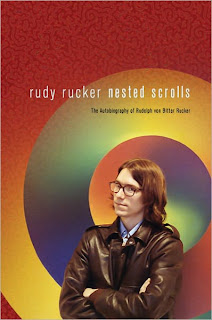Rudy Rucker has always seemed one of the more personally interesting SF writers: descendant of the philosopher Georg Heigel, professor of math and computer science, devoted to writing SF with real science that also incorporated his personal life and experiences, a style he dubbed "Transrealism." His novels have been wild and raw-nerve affairs for his entire career, from
White Light to
Postsingular -- they've all had a consistent mad-professor tone and a loose-limbed laid-back affect, in which even the most bizarre and extreme transformations (man to robot to alien, at the very mildest) are just something to shrug about and live with. A favorite SF writer of slackers, surfers, and math-heads, Rucker could have been the second coming of Philip K. Dick: just as dazed by the wonders of life and identity, but one rung up on the karmic ladder and happy to see what happened next.
Nested Scrolls
is the story of Rudy Rucker's own life; how he became the man who wrote those novels, and what was going on in his life while he wrote them.
It's a surprisingly conventional autobiography, beginning with Rucker's earliest childhood memories and moving forward chronologically through his life. It tells all of the stories of Rucker's life to date, and is as interesting in the rhythms of a family (through his own childhood, marriage in college, and eventual children) and the terrors and rigors of the academic life (Rucker was
nearly a top-rank math researcher, but he didn't get that one big paper, breakthrough or theory when he needed it, and so settled into teaching college math, and eventually computer science, at a series of mid-rank schools) as it is about Rucker's SF career.
Rucker is a thoughtful, introspective man accustomed to writing long prose -- and he has more than a hint of the Richard Feynman-esque wild man about him -- and
Nested Scrolls launched out of a near-death experience (a cerebral hemorrhage) in 2008: so this is both a book Rucker was well able to write and one that he knew he had to do
now.
Nested Scrolls has some of that urgency to it, as if it's the things that Rucker needs to get down on paper, the details of his life or of life itself, while he still has time.
A writer's life is not full of big events, nor is an academic's. Still, Rucker's Transrealist style -- the point is to "write like yourself, only more so" -- makes
Nested Scrolls an engrossing, deeply thoughtful amble through one well-lived life. It's vital for readers of Rucker's novels, and exceptional even for those who've never read him before.

No comments:
Post a Comment